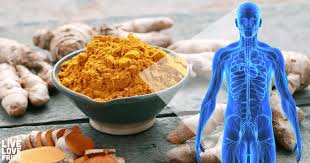
In the realm of natural pain relief, turmeric has emerged as a shining star, revered for its vibrant hue and powerful healing compound, curcumin. Originating from the roots of the Curcuma longa plant, turmeric has been a cornerstone of traditional medicine for centuries. This article explores the extraordinary benefits of turmeric in alleviating pain and inflammation, shedding light on its potential to transform the landscape of natural pain relief.

Curcumin’s Anti-Inflammatory Power:
At the heart of turmeric’s pain-relieving prowess lies curcumin, a natural anti-inflammatory compound. Inflammation is a common contributor to various types of pain, including arthritis and muscle soreness. By inhibiting inflammatory pathways, curcumin addresses the root cause of pain, providing relief without the side effects often associated with pharmaceutical anti-inflammatory drugs. One of the primary mechanisms through which curcumin exerts its anti-inflammatory effects is by suppressing the activation of NF-kB, a transcription factor that plays a central role in inflammation. By modulating NF-kB, curcumin helps regulate the expression of genes involved in the inflammatory response. Curcumin showcases its versatility by downregulating the activity of various inflammatory mediators, including cytokines and enzymes. This comprehensive modulation helps alleviate inflammation and its associated symptoms across a spectrum of conditions. Beyond its anti-inflammatory prowess, curcumin dons the armor of an antioxidant. It neutralizes free radicals, highly reactive molecules that contribute to oxidative stress and inflammation. This dual action as an anti-inflammatory and antioxidant agent enhances its ability to combat inflammatory processes comprehensively.

Arthritis Alleviation:
For individuals grappling with arthritis, turmeric offers a beacon of hope. Studies suggest that curcumin’s anti-inflammatory and antioxidant properties may help reduce symptoms of arthritis, including joint pain and stiffness. Regular consumption of turmeric or curcumin supplements may contribute to improved joint health and increased mobility. Curcumin may contribute to a reduction in joint pain, a prevalent and debilitating symptom of arthritis. Its ability to modulate inflammatory responses in the joints makes turmeric a compelling natural option for those seeking relief without the potential side effects of conventional medications. It may aid in protecting joint tissues and preventing further damage by neutralizing free radicals and promoting a balanced inflammatory response. Incorporating turmeric into the diet or taking curcumin supplements has shown promise in enhancing joint mobility, allowing individuals to maintain an active and fulfilling lifestyle.

Muscle and Joint Recovery:
Muscle and joint discomfort often stem from inflammation, whether due to strenuous physical activity or underlying conditions. Turmeric’s curcumin acts as a resilient defender against inflammation, soothing the affected areas and expediting the recovery process. This anti-inflammatory prowess makes turmeric an invaluable companion for athletes and individuals seeking effective and natural recovery solutions. For fitness enthusiasts and athletes, post-exercise soreness is a common companion. Turmeric’s anti-inflammatory effects help alleviate muscle soreness and stiffness, promoting a quicker recovery and reducing the downtime between workouts. Turmeric’s ability to reduce inflammation in the joints contributes to improved flexibility and comfort. Whether recovering from an injury or managing conditions like arthritis. Turmeric’s antioxidant properties neutralize free radicals, reducing oxidative stress and supporting the body’s natural repair mechanisms. Turmeric may act as a natural muscle relaxant, easing tension and promoting relaxation.

Neuropathic Pain Relief:
Neuropathic pain often stems from damage or dysfunction in the nervous system. Curcumin, the active ingredient in turmeric, acts as a neuroprotective shield, safeguarding nerve cells from inflammation and oxidative stress. This protective mechanism may contribute to a reduction in neuropathic pain and its associated symptoms. Turmeric’s anti-inflammatory prowess extends to the intricate network of nerves, helping mitigate inflammation and providing relief for individuals experiencing neuropathy. Studies suggest that curcumin’s interaction with neurotransmitters and pain receptors may contribute to reducing nerve-related pain, making it a compelling natural option for those seeking relief from neuropathic discomfort. Turmeric’s antioxidant properties neutralize free radicals, reducing oxidative stress and supporting the body’s natural repair mechanisms. Turmeric’s potential neuroprotective effects may support cognitive health, offering benefits beyond pain relief.

Digestive Comfort:
Digestive discomfort often arises from inflammation in the gastrointestinal tract. Curcumin, the active ingredient in turmeric, exhibits potent anti-inflammatory properties that extend to the digestive system. By mitigating inflammation, turmeric helps alleviate discomfort and contributes to a more harmonious digestive environment. Turmeric’s anti-inflammatory and antioxidant properties work synergistically to create a soothing effect on the gastrointestinal tract. Turmeric has been studied for its potential prebiotic effects, promoting the growth and activity of beneficial gut bacteria. This balance in the microbiome supports digestive health and contributes to a resilient gut ecosystem. Studies suggest that curcumin’s modulating effects on inflammation and gut motility may help manage symptoms associated with IBS, providing relief for those with this common digestive disorder. The liver plays a crucial role in digestion by producing bile, which aids in the breakdown of fats. Turmeric’s potential to support liver function enhances the digestive process. It promotes the efficient secretion of bile, contributing to the digestion and absorption of nutrients.
Safe and Well-Tolerated:
One of the notable advantages of turmeric as a pain relief option is its safety profile. When used as a spice in culinary dishes or consumed as a supplement, turmeric is generally well-tolerated. Unlike some pharmaceutical pain relievers, turmeric is less likely to cause adverse effects on the liver, kidneys, or gastrointestinal tract.
Conclusion:
Turmeric stands as a beacon in the world of natural pain relief, offering a holistic approach to managing various types of discomfort. Whether addressing arthritis, muscle soreness, or neuropathic pain, the golden spice’s anti-inflammatory and antioxidant properties make it a compelling option for those seeking natural and safe alternatives. As with any supplement, it’s advisable to consult with a healthcare professional to determine the most suitable form and dosage of turmeric for individual health needs. Embracing the golden spice might just be the transformative step towards a more vibrant and pain-free life.
